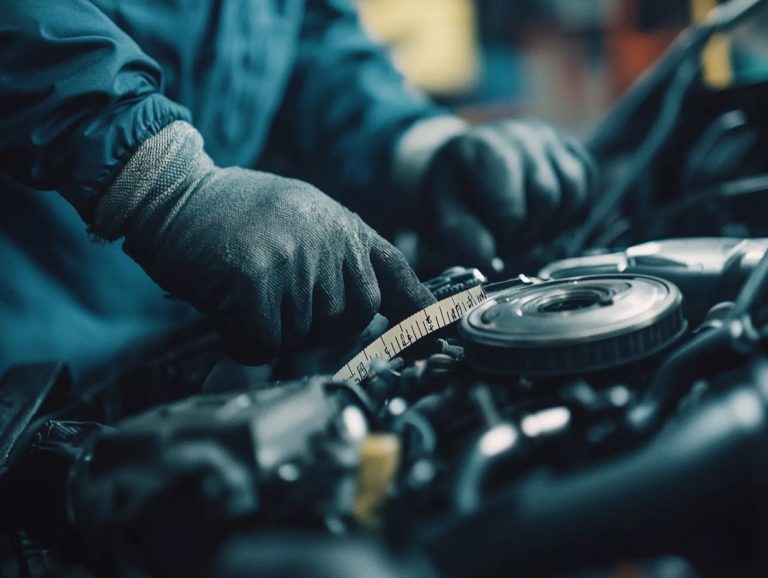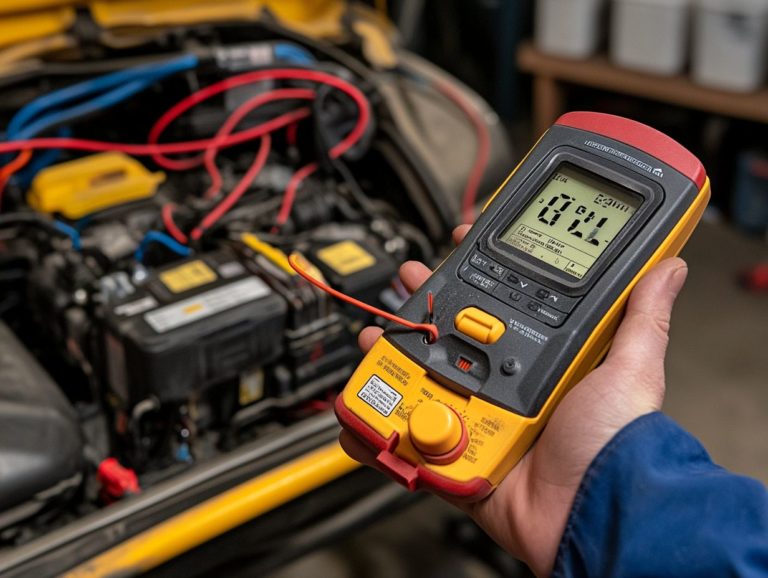What Are the Signs of a Failing Fuel Pump?
The fuel pump serves as a vital component of your vehicle’s engine system, ensuring that fuel reaches the engine with optimal efficiency. Grasping its function and significance is essential for maintaining your car s performance.
This article delves into the common signs of a failing fuel pump, explores potential causes of malfunction, and outlines effective diagnostic techniques. You will also find a comprehensive guide to the replacement process, along with valuable tips to help prevent future failures.
Staying informed will empower you to keep your vehicle running smoothly and reliably.
Contents
Key Takeaways:
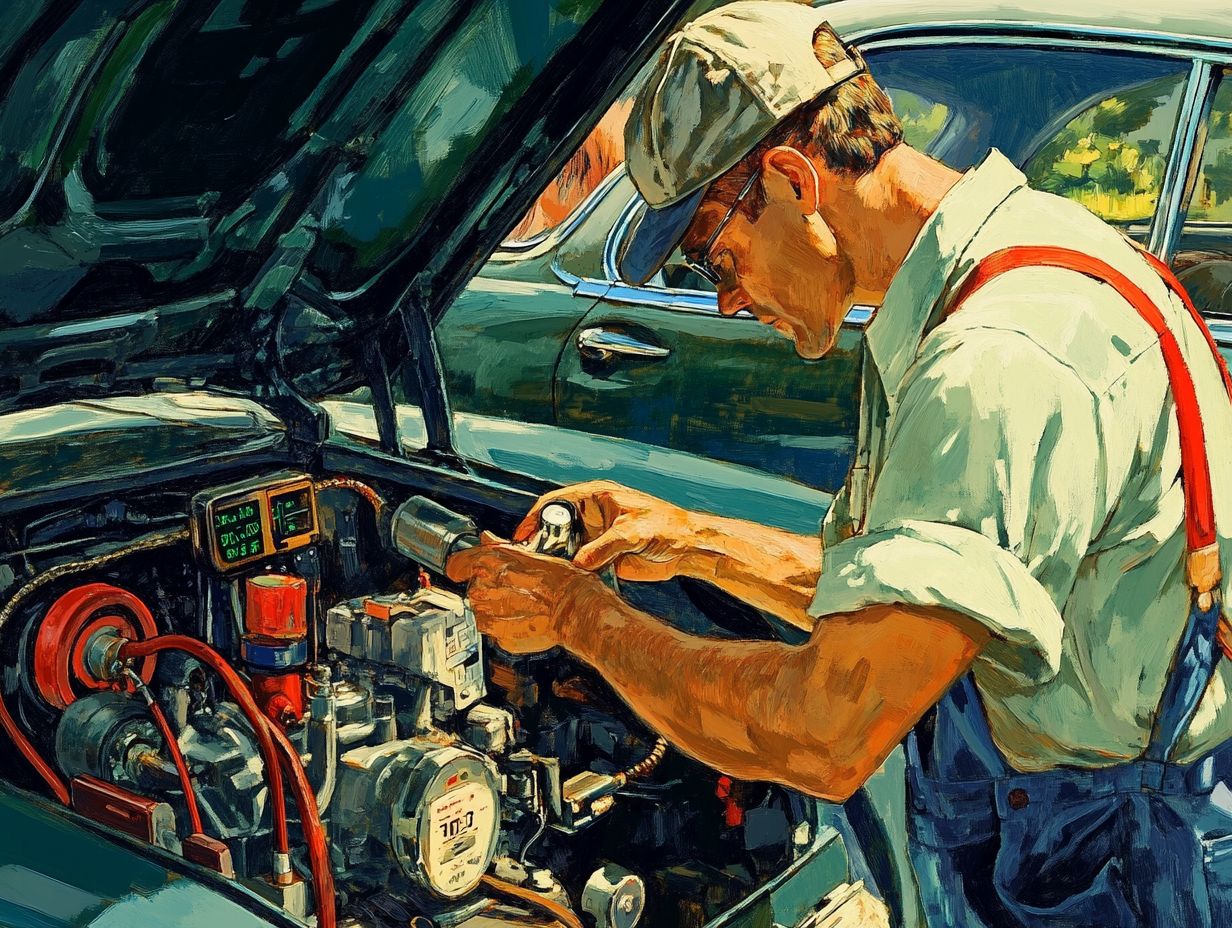
- Strange noises or stalling? Act fast!
- Causes of failure can include old age or clogged filters. Regular maintenance is key.
- Replacing a failing fuel pump requires specific tools and knowledge of your vehicle s model.
What Your Fuel Pump Does for Your Ride
The fuel pump is a vital component of your vehicle’s fuel system, tasked with delivering gasoline from the fuel tank to the engine. Here, it mixes with air where fuel and air mix to create energy to generate the power needed to propel your car.
Understanding this function is crucial. A properly functioning fuel pump ensures optimal fuel efficiency, enhances engine performance, and helps prevent common issues such as engine sputtering and power loss. Neglecting fuel pump maintenance can result in serious vehicle problems, including a dead engine and challenging starts, highlighting the necessity of regular checkups.
Function and Importance
The primary function of your fuel pump is to deliver a steady supply of gasoline to your engine, ensuring that the fuel mixture is just right for optimal combustion and reduced emissions.
When your fuel pump is operating effectively, it becomes a vital player in enhancing your engine’s performance. A consistent flow of fuel allows for better ignition and smoother operation, leading to a more enjoyable driving experience.
Any hiccups in fuel delivery can manifest as frustrating performance issues, such as power loss, stalling, or rough idling. These problems not only hinder your vehicle’s acceleration but also compromise its overall fuel efficiency.
By maintaining the right pressure and flow rate, the pump guarantees that your engine runs seamlessly. This allows you to enjoy a more responsive and engaging drive, underscoring the importance of a well-functioning fuel pump.
Common Signs of a Failing Fuel Pump
Spotting the signs of a failing fuel pump can save you a lot of trouble! Recognizing symptoms such as engine sputtering, difficulty starting, and noticeable power loss can help prevent serious engine problems and ensure your vehicle operates efficiently without sacrificing performance.
If you hear unusual noises from the fuel tank or experience inconsistent acceleration, these are warning signs you should not overlook. Addressing these issues promptly can help you avoid costly repairs and preserve your vehicle’s integrity.
Symptoms to Look Out For
When you suspect a failing fuel pump, keep an eye on several symptoms: engine sputtering, difficulty starting, and any unusual noises from the fuel tank. These can be early indicators that something is amiss with your vehicle s fuel delivery system.
For example, engine sputtering during acceleration might suggest that the pump isn t delivering fuel consistently, disrupting engine performance. Struggling to start your vehicle can be incredibly frustrating and often hints at an inadequate fuel supply. Additionally, strange noises from the fuel tank could signal internal failures or impending pump wear, which could lead to more serious engine problems.
Collectively, these indicators are vital. Ignoring them could result in diminished power, poor fuel efficiency, and ultimately, expensive repairs.
Stay alert to these signs and keep your vehicle s performance at its best!
Causes of Fuel Pump Failure
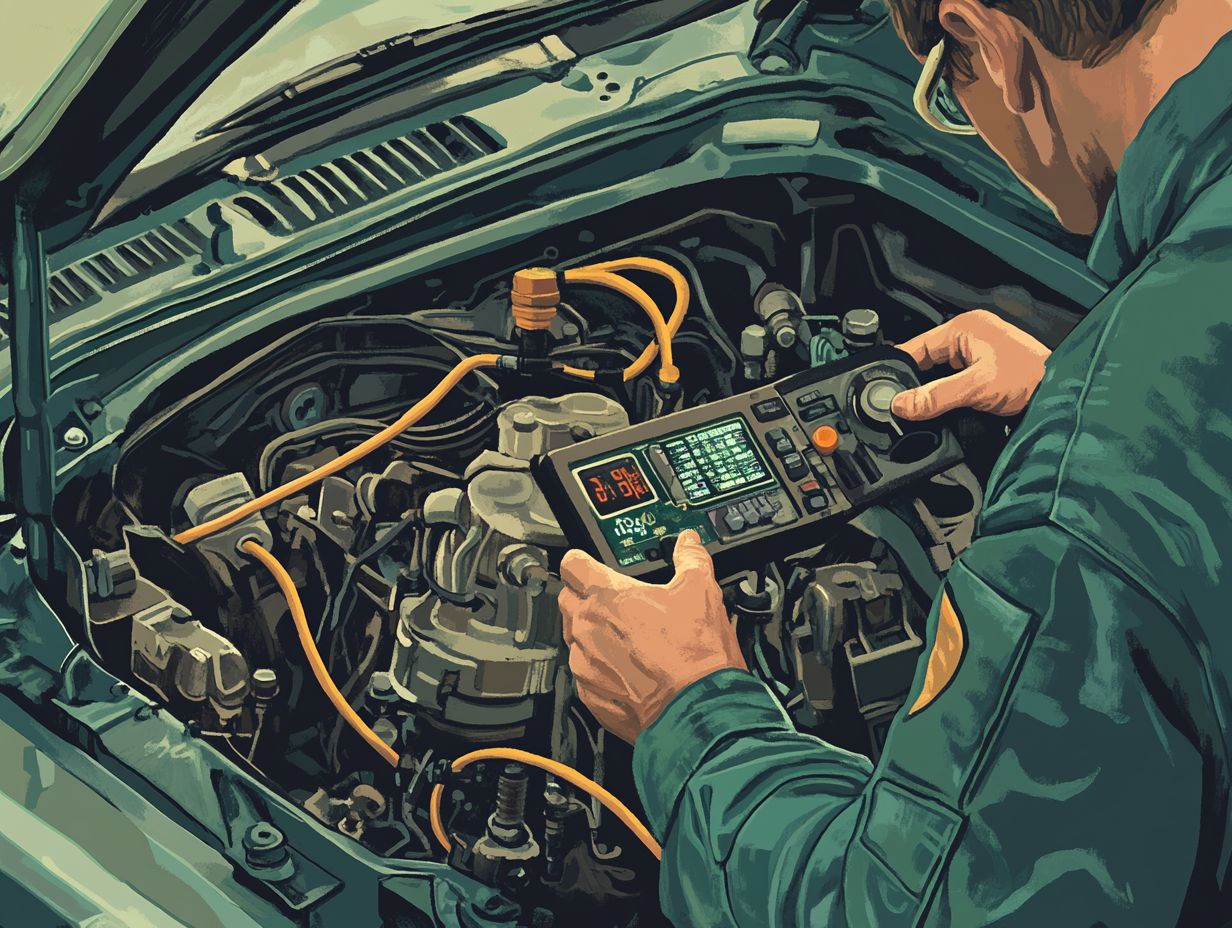
Fuel pump failure can happen for several reasons, such as contamination in the fuel tank, normal wear and tear, or even overheating engines that strain the pump s performance over time. By understanding these causes, you can develop effective maintenance strategies.
Factors like a clogged fuel line or the use of low-quality gasoline can contribute to pump malfunctions. This makes regular vehicle checkups vital to prevent these issues and keep your engine running smoothly.
Possible Reasons for Malfunction
Possible reasons for fuel pump malfunction include contamination from debris in the fuel tank and overheating from prolonged use. Damage to the fuel line can restrict fuel delivery, impacting performance.
These factors can significantly hinder the efficiency and reliability of your vehicle’s fuel system. Contamination from debris doesn t just clog filters; it can wear down the intricate components of the pump over time, leading to decreased performance.
When overheating occurs, it’s often a result of continuous operation without adequate cooling, potentially leading to pump failure or inefficiency. Damage to the fuel line can create leaks or blockages, disrupting the flow of fuel and ultimately affecting engine performance.
Understanding these issues enables you to take proactive measures to maintain your fuel system and ensure a smooth ride.
Ready to Diagnose a Failing Fuel Pump?
Diagnosing a failing fuel pump demands careful steps using different tests. You ll want to start by checking the fuel pressure, as this is crucial for ensuring optimal engine performance.
Next, evaluate the engine power to identify any inconsistencies. Finally, listen carefully for any abnormal noises that could signal underlying issues. Each step is essential in pinpointing the problem with precision.
Tests and Techniques for Identification
To identify a failing fuel pump, you can conduct tests such as measuring fuel pressure and monitoring any engine sputtering during acceleration. These methods can provide critical insights into its functionality.
Alongside these tests, perform a visual inspection of the fuel lines for leaks or damage. This step can reveal underlying issues that may hinder proper fuel delivery.
Check for error codes using an OBD-II scanner to find electrical problems linked to the pump. Use a multimeter to check that the pump gets the right voltage. This ensures it operates properly.
Together, these diagnostics not only highlight a failing fuel pump but also guide you toward a more accurate evaluation of the entire fuel delivery system.
Replacing a Failing Fuel Pump
Replacing a failing fuel pump is crucial for keeping your car running smoothly! Improper installation can lead to complications and costly repairs later on.
It s vital to select a pump that s compatible with your vehicle s make and model. Adhering to maintenance tips can significantly extend the lifespan of your new pump.
Engaging a professional mechanic for the replacement process ensures that everything aligns with safety and performance standards, giving you peace of mind as you drive.
Don’t wait! Keep your car in top shape by monitoring your fuel pump today!
Steps and Considerations for Replacement
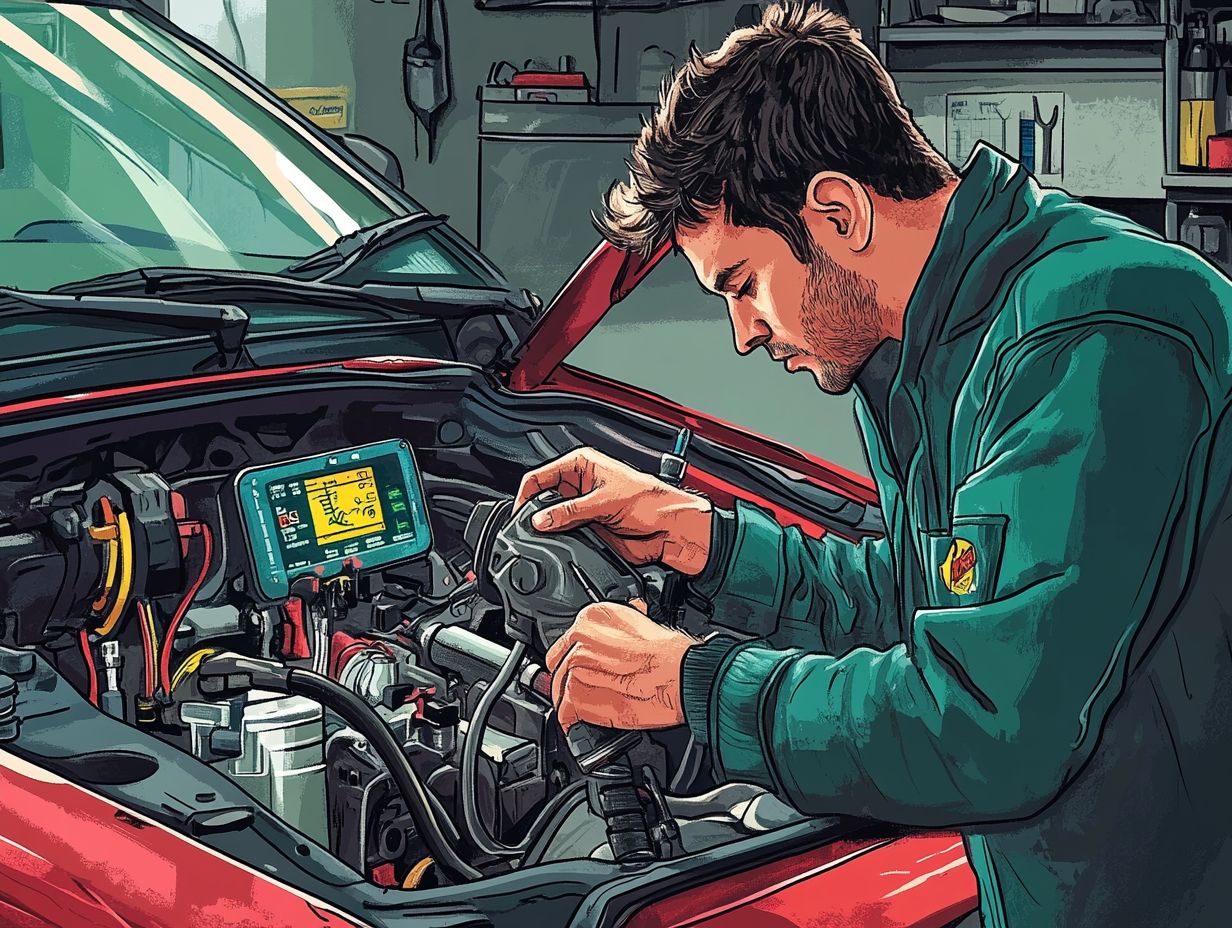
When replacing a fuel pump, you need to follow essential steps:
- Disconnect the battery
- Relieve fuel pressure
- Carefully remove the old pump while keeping vehicle maintenance guidelines in mind.
These foundational actions are critical for ensuring both your safety and the efficiency of the process.
Begin by gathering the necessary tools think wrenches, screwdrivers, and a fuel line disconnect tool.
It’s also vital to work in a well-ventilated area to mitigate risks associated with fuel fumes. Once you’ve secured your workspace, take the time to thoroughly check the fuel system for any potential leaks or damages.
As you remove the old pump, pay close attention to its orientation and connections; this will greatly facilitate the installation of the new pump. Follow the manufacturer’s guidelines for your vehicle to make the replacement process significantly smoother.
Preventing Fuel Pump Failure
Keep your fuel pump in top shape! Regular maintenance and adherence to fuel system care guidelines are crucial. This diligence ensures your vehicle operates with optimal efficiency and reliability.
By incorporating high-quality gasoline and routinely inspecting your fuel tank for any signs of contamination, you can significantly extend the lifespan of your fuel pump. This safeguards your investment and enhances your driving experience.
Tips for Maintaining a Healthy Fuel Pump
To keep your fuel pump in prime condition, embrace essential maintenance tips:
- Opt for high-quality gasoline.
- Routinely check the fuel filter.
- Commit to regular vehicle maintenance.
These practices significantly enhance the efficiency of your fuel pump and prolong its lifespan, minimizing the likelihood of expensive repairs down the line. Using high-quality fuel reduces deposits and impurities that could clog the system, ensuring a smooth operation.
A clean, well-functioning fuel filter is vital, as it protects the pump from contaminants that could inflict serious damage.
By scheduling regular vehicle maintenance, you enable early detection of potential issues. This allows you to address them promptly and bolster your vehicle’s overall reliability. Following these guidelines will lead to improved performance, greater fuel efficiency, and the peace of mind you deserve as a vehicle owner.
Frequently Asked Questions
What Are the Signs of a Failing Fuel Pump?
A failing fuel pump can cause a number of issues for your vehicle. Some common signs to look out for include:
What are the symptoms of a failing fuel pump?
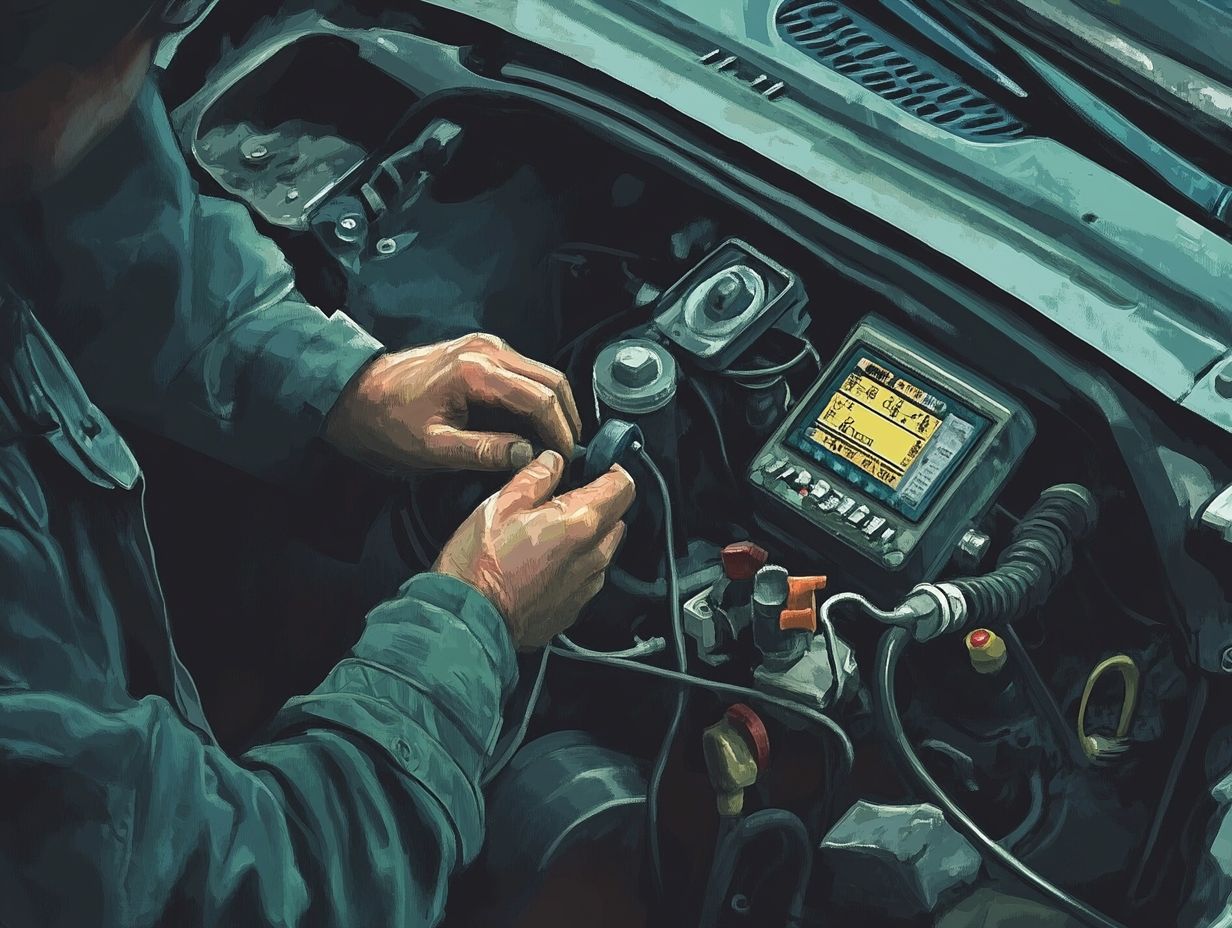
The symptoms of a failing fuel pump can include difficulty starting your vehicle, sputtering or stalling while driving, and a noticeable decrease in fuel efficiency.
How can I tell if my fuel pump is going bad?
One way to tell if your fuel pump is failing is by monitoring your vehicle’s fuel efficiency. If you notice a significant decrease in how far you can drive on a full tank of gas, it could be a sign of a faulty fuel pump.
What causes a fuel pump to fail?
Many potential causes exist for a fuel pump to fail, including old age, contaminated fuel, and electrical issues. Regular maintenance and proper fuel usage can help prolong the life of your fuel pump.
Can a bad fuel pump damage my engine?
If left untreated, a failing fuel pump can potentially cause damage to your engine. A lack of proper fuel flow can lead to engine misfires and other issues that can harm your engine’s performance and longevity.
How can I prevent my fuel pump from failing?
To avoid fuel pump failure, regularly maintain your vehicle and use high-quality fuel. Keep an eye out for any potential signs of a failing fuel pump and address them promptly to avoid further damage.



